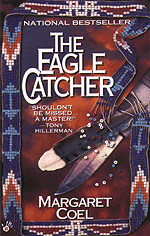


Winter's Child
Man Who Fell from Sky
Night of the White Buffalo
Killing Custer
Buffalo Bill's Dead Now
The Perfect Suspect
The Spider's Web
Silent Spirit
Blood Memory
Girl w/ Braided Hair
Drowning Man
Eye of the Wolf
Wife of Moon
Killing Raven
Shadow Dancer
Thunder Keeper
Spirit Woman
Lost Bird
Story Teller
Dream Stalker
Ghost Walker
Eagle Catcher







|
 |

 The Eagle Catcher: An Interview with Margaret Coel
The Eagle Catcher: An Interview with Margaret Coel
How did you become acquainted with the Arapaho people on the Wind River
Reservation?
The Arapahos are very private people with reason to distrust outsiders.
You can't just show up on the reservation and say, "Hi, I'm here to write
about you." You must gain their trust, which takes times. I first went to
the Wind River when I was writing Chief Left Hand, a biography of one of the
great Arapaho leaders in the mid 1800s when the tribe lived on the plains of
Colorado. Another historian accompanied me and introduced me to her Arapaho
friends. Because she vouched for me, in a sense, and because they trusted
her, they were willing to talk to me. Also, many Arapahos have told me how
much they liked Chief Left Hand. The book was a big help in gaining their
trust for the mystery novels.
How did the Arapahos like The Eagle Catcher?
Well enough that some of my Arapaho friends planned a celebration for me
on the reservation. They wanted it to take place at Blue Sky Hall, since
the hall appears in the novel. We had a feast, music, dancers and a master
of ceremonies. It was great!
Can you give us another memorable experience on the reservation?
I would say all of my experiences have been memorable. But one stands
out. I was visiting with some Arapaho friends outdoors when a golden eagle
began circling us. One of the women said, "The eagle is upset because we're
talking to an outsider about our culture." That was the end of our
conversation. But the next day, they came and found me. They had consulted
one of the elders who reminded them that whenever the eagle comes, it is a
good sign. "This white woman," he said, "will write the truth about our
people." Since then, my Arapaho friends have explained many things that
have helped me better understand the Arapaho culture. I am very grateful to
the eagle.
How did your background as a history writer influence The Eagle Catcher
and your other novels?
It has made them what they are: contemporary mysteries grounded in
history. I'm fascinated by the way the past continues to shape the present.
Nothing is ever over. The plot of The Eagle Catcher, for example, revolves
around a kind of fraud routinely practiced against the Indian people when
they were moved onto reservations. I wanted to examine the ways in which
that past injustice continues to insert itself into their lives today.
You were also a journalist. How does your journalistic background
influence the mysteries?
It's probably the journalist part of me that compels me to write about
actual issues. All of the novels deal with real issues facing the Arapahos
and other Indian peoples today. I like to explore the ramifications on
individual lives of such things as nuclear waste storage facilities, illicit
drug labs and casinos on Indian lands. Such issues are tailor-made for
mystery novels.
|

|

